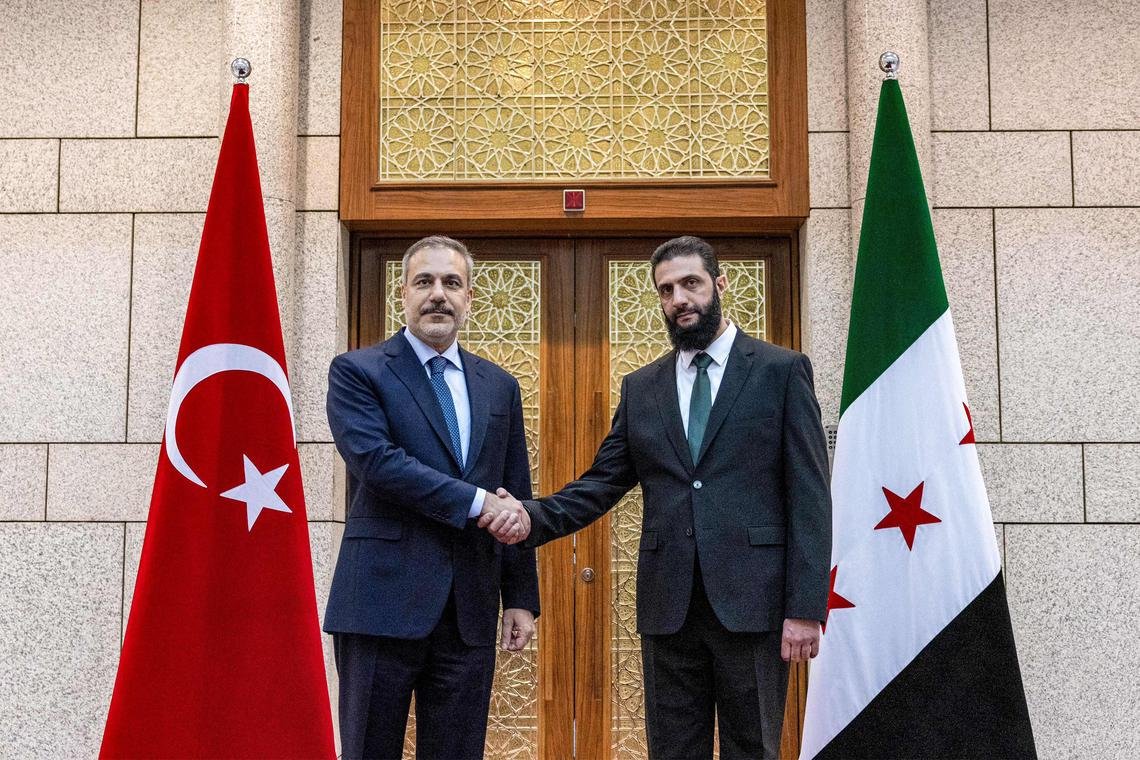DAMASCUS – Two weeks after seizing power in a sweeping offensive, Syria’s new leader, Mr Ahmed al-Sharaa, has stepped up regional contacts, vowing in a meeting on Dec 22 not to “negatively” interfere in neighbouring Lebanon.
Mr Sharaa also met Turkish Foreign Minister Hakan Fidan, a video released by the Anadolu state news agency showed, after Ankara-backed rebels played a key role in supporting his Islamist group Hayat Tahrir al-Sham (HTS), which seized Damascus on Dec 8 and ousted long-time ruler Bashar al-Assad.
Turkey has maintained strong ties with Syria’s new leaders and Ankara’s intelligence chief, Mr Ibrahim Kalin, was in Damascus just four days after Mr Assad’s regime fell.
Regional powerhouse Saudi Arabia is also in direct contact with Syria’s new government, having supported the opposition to Mr Assad for years during Syria’s civil war, and will send a delegation to the country soon, Syria’s ambassador in Riyadh said.
During his meeting with visiting Lebanese Druze chiefs Walid and Taymur Jumblatt, Mr Sharaa said Syria would no longer exert “negative interference in Lebanon at all”.
He added that Damascus “respects Lebanon’s sovereignty, the unity of its territories, the independence of its decisions and its security stability”.
Syria “will stay at equal distance from all” in Lebanon, Mr Sharaa added, acknowledging that Syria has been a “source of fear and anxiety” for the country.
Mr Walid Jumblatt, long a fierce critic of Mr Assad and his father, Hafez, who ruled Syria before him, arrived in Damascus on Dec 22 at the head of a delegation of lawmakers from his parliamentary bloc and Druze religious figures.
The Druze religious minority is spread across Lebanon, Syria and Israel.
He met Mr Sharaa – also known as Abu Mohammed al-Jolani – at the presidential palace, where the new Syrian leader wore a suit and tie instead of the olive-green military shirt he sported just days ago.
Mr Walid Jumblatt accuses the former Syrian authorities of having assassinated his father in 1977 during Lebanon’s civil war.
The Syrian army entered Lebanon in 1976, only leaving in 2005 after enormous pressure following the assassination of former prime minister Rafic Hariri, a killing attributed to Damascus and its ally, Lebanon’s Iran-backed Hezbollah group.
‘Insecurity’
Mr Assad was an adherent of the Alawite offshoot of Shi’ite Islam and projected himself as a protector of the country’s religious and ethnic minorities.
The seizure of power by the Sunni Islamists of HTS – proscribed as a terrorist organisation by many governments, including the United States – has sparked concern, though the group has recently sought to moderate its rhetoric.
Despite worries over Syria’s future, global powers, including the US and the European Union, have stepped up contacts with the war-ravaged country’s new leaders, urging them to guarantee protections for women and minorities.
The foreign leaders have also stressed the importance of combating “terrorism and extremism”.
The supreme leader of Iran – a key backer of Mr Assad’s administration before it fell to the rebels – on Dec 22 predicted “the emergence of a strong, honourable group” that would stand against “insecurity” in Syria.

A Syrian soldier inspects a makeshift lab used by the Assad regime to manufacture a psychostimulant drug on an industrial scale.PHOTO: AFP
Mr Ayatollah Ali Khamenei said Syria’s young men would “stand with strength and determination against those who have designed this insecurity and those who have implemented it, and God willing, he will overcome them”.
Mr Assad had long played a strategic role in Iran’s “axis of resistance”, a loose alliance of regional proxy forces, particularly in facilitating the supply of weapons to Hezbollah in neighbouring Lebanon.
That axis has suffered heavy blows over the past year with Israel’s decimation of the leadership of Hezbollah in Lebanon and Hamas in Gaza.
Mr Khamenei nonetheless denied that these armed groups acted as proxies, adding that: “If one day we want to take action, we do not need a proxy force.” AFP
Join ST’s Telegram channel and get the latest breaking news delivered to you.
